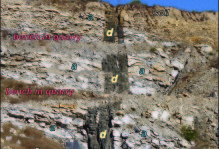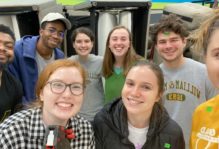Diverging and complementary views.
It was great to see so many at yesterday’s event (I didn’t expect an SRO crowd). And the mix of participants was exciting—faculty, emeritus faculty, students (grads and undergrads), alumni, staff, administrators. The panelists effectively put forth both diverging and complementary views (thank you, again, panelists!), and the many contributions of the audience made for a wide-ranging discussion.
A summary of the discussion will be posted on the website early next week, but I’ll just mention two thoughts I took away from it. First, there is strong and engaged interest in this topic across a broad swath of our community and, second, while we don’t agree on whether “liberal arts university” is the best _name_ for what who we and what we do, there seems to be an underlying consensus that we combine broad learning and research distinctively. Now we need to parse this combination with greater specificity. And we’ll have the chance to do that during our year-long conversation—both in the “formal” events and in the many smaller conversations that I believe will ramify across the campus.
Michael R. Halleran
Provost
Comments are currently closed. Comments are closed on all posts older than one year, and for those in our archive.




The question about our peer groups at yesterday’s session prompts me to make this point: in the past (and currently), as a public VA. university, our peer group is selected/negotiated for a variety of reasons beyond intellectual compatibility – among the many uses of a peer group some have been political – at least covertly. Thus, a few decades ago when peer groups were initially chosen by SCHEV, in consultation with the institutions, our then provost (Schiavelli) was politically adroit in his fight to acquire for us a group of peers many of whose salaries were higher than ours. Accordingly, we were “positioned,” relative to this peer group, as in need of salary boosts in order to be more like them. It was a very clever move, frankly.
I am less familiar with the reasoning behind today’s peer group but I think we need to acknowledge the possibility of multiple peer groups for multiple reasons. We might – and likely do have – a very different group of aspirational peers when we concentrate only on intellectual compatibility and not on the politics of State funding. Furthermore, we likely have, and will continue to have, a different peer group for admissions etc etc.
So, as we move forward in strategic planning, we need to be aware of the fact that we are unlikely to ever have just one set of peers.